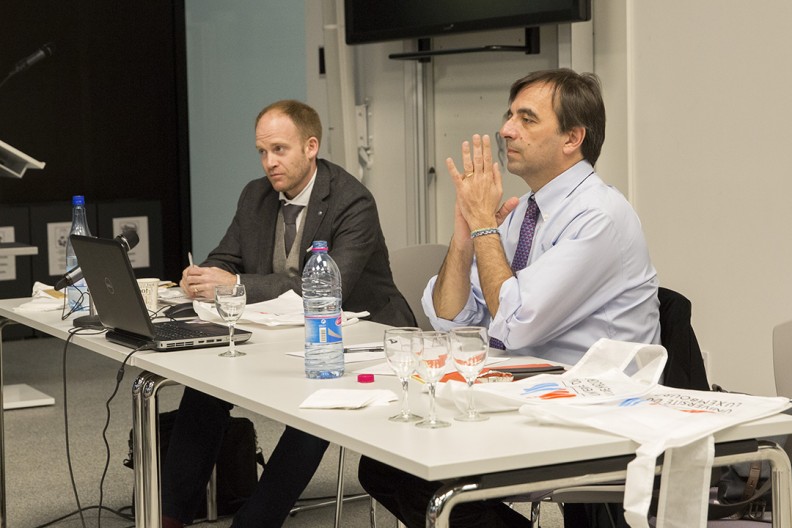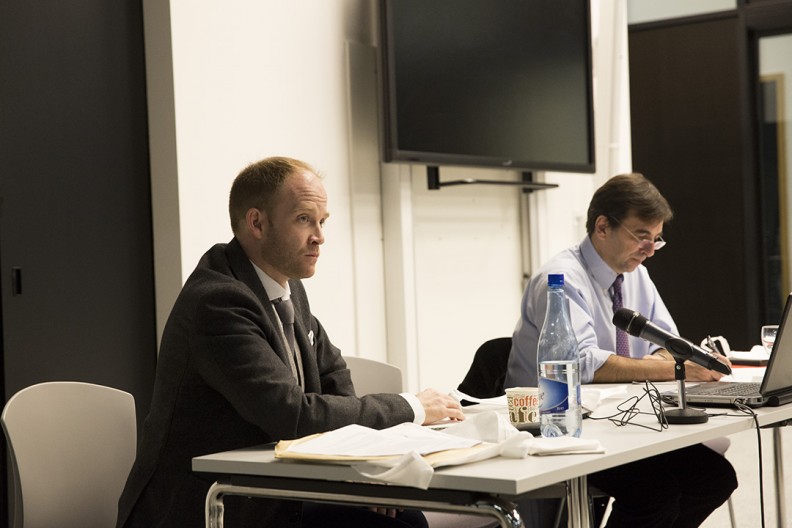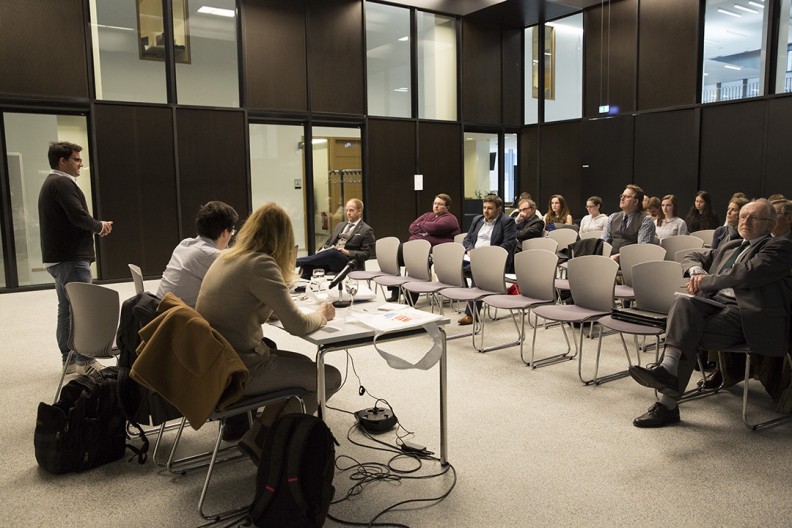The conference “Benelux, Europe and the Cold War, the power of non-powers”, which took place on 30 and 31 March 2017 at the University of Luxembourg, was the first of three events planned in the FNR-funded CORE junior project “Benelux”, as part of its public outreach and academic output objectives. The conference sought to highlight asymmetrical power relations in the Cold War period of European integration by examining European security. What was/is European security in the context of the Cold War? How was and is it conceived? What role did “non-powers” play in European security, and how did they help define it? This conference investigated these and other related questions by re-examining the US/European relationship in the early Cold War and the role that developments during this period played in the European integration movement. In so doing, the conference also showcased findings which helped unify historiographies of the Cold War and European integration.
The conference was opened by C²DH Director Andreas Fickers, who warmly welcomed the speakers, guests and students to the first such event hosted by the C²DH. He then handed over to me to introduce Spyros Economides, Professor of International Relations and European Politics and Director of the Hellenic Observatory at the London School of Economics.
Keynote lectures
Professor Economides kicked off the conference and delivered the introductory keynote lecture entitled “The European Union as a security community”. His address focused on the different theoretical models that can be applied when looking at the European Union as a security community. He referred to the work of Karl Deutsch from 1957 in defining a “security community”, drawing attention to the need to differentiate between “internal” and “external” security communities. Though Deutsch was not referring to Europe in his work, Professor Economides felt that the terms he used could be adapted to describe the European Union and the conflict between idealist and realist interpretations of its raison d’être. Specifically, he highlighted the tension between these two interpretations: the former is based on shared values such as democracy and human rights, while the latter is based on meeting the security objectives of the two main powers, France and Germany. According to Economides, this tension is particularly evident in the post-Cold War world but is paradoxically also only possible since the idealist objective of peace and the realist objective of security are both met because of the international situation. The tension between these two extremes was present from the beginning of the EU, but only in the context of the Cold War could they be reconciled to achieve further integration. The existential threat of the Soviet Union jeopardised both in equal yet different ways, forcing compromise and cooperation. In the absence of this tension in the post-Cold War period, the two ideals now compete and have in fact been transformed, since it seems as though the shared ideal of this security community is now based solely on economics.
To finish the first day, Professor Anne Deighton, Emeritus Professor of European International Politics and Fellow at Wolfson College, University of Oxford, delivered the second keynote lecture entitled “European security: Past, present and future”. In her discussion, Professor Deighton explained that in many ways the concept of European security can be expanded, touching on the idea of longue durée and going back at least as far as the Congress of Vienna and its focus on the idea of the balance of power. She also spoke about the impact of Brexit on collective European security, explaining that as historians it is our duty to try to understand and then clearly explain the past. Moving from the “contemporary” to the “digital” mission of the C²DH, Professor Deighton also spoke about the impact of technology on the work of the historian. She both praised and urged caution in the use of new media, as the time for reflection upon critical events has in recent decades been rapidly shortening. In such a context, now more than ever, historians will be needed to offer some sort of clarity and context to the events we are witnessing.
Panels
The contribution by Professor Andrea Locatelli looked at the beginning of the EU and the focus on economics. The Professor of Economic History in the Department of Economic History at the Catholic University of the Sacred Heart, Milan, presented “The social plans from ECSC to ESF: a model of capitalism at the beginning of the Cold War”. In his paper he specifically demonstrated how the ECSC implemented social policies to support workers in order to limit the appeal that communism may have had for them, highlighting the way in which post-WWII Western European governments perceived the link between strong social policies and stable societies.
Moving from the general aspects of European social policy to specific examples of private company initiatives in such areas, Dr Alberto Manzini presented “Relations économiques et circulation de pratiques managériales: une analyse comparative de l’influence nord-américaine sur le welfare d’entreprise en Italie et Espagne”. He showed how the Cold War permeated the business practices of industry in different ways in Spain and Italy, explaining that, despite strong influences from the United States, companies nonetheless managed to implement and maintain welfare programmes for their workers. On a practical note, Manzini’s paper also highlighted a unique methodological approach in that he relied almost exclusively on the private archival records provided by the companies he examined.
Continuing to explore the link between economics, social policy and security, Dr Hans Jorgensen, Assistant Professor in Economic History in the Department of Geography and Economic History at Umeå University, Sweden, presented “The East Economic Bureau (EEB): Swedish business-state cooperation and economic intelligence during the Cold War”. The paper focused on the EEB, a secret organisation staffed with leading heads of industry and members of the Swedish military, that was tasked by the Swedish government with exploring and exploiting possible business opportunities with communist countries. Given Sweden’s role as a “non-power”, Dr Jorgensen explained how his early investigations into the reasons for and activities of the EEB revealed the importance placed by the Swedish government on exploiting any potential avenues for economic relations with the Eastern bloc. He also highlighted the need to further investigate the role played by the Finnish government in the EEB; as an officially neutral country at this time, Finland had maintained economic relations with the USSR.
On the subject of secret/concealed archives, Professor Irini Lagani, Professor of Contemporary European History in the Department of Political Science and History at Panteion University, Athens, presented “La guerre froide était-il inévitable? Tentative d’une réponse à travers la vision de Charles de Gaulle et de ses collaborateurs de la Grèce et de l’Europe d’après-guerre”. In this paper Professor Lagani showed how memos which had vanished from the French National Archives in Paris could still be found in the archives of the French Foreign Ministry in Athens. The information contained in these documents sheds light on General de Gaulle’s visits to Moscow in the 1960s and French knowledge of high-level officials in the Greek government who collaborated with the Nazis in WWII. The mention of de Gaulle’s visits to Moscow is significant, since they demonstrate his attempts to give France a more influential role in international affairs by striking out on a course independent from the UK and the USA, especially as regards relations with the USSR and China.
My contribution was entitled “To pay or not to pay: A historical and legal overview of the question of WWII reparations, and its impact on European (dis?) integration”. In this paper, which highlighted the significance of regional politics in affecting and reflecting international/transnational events, I showed how recent discoveries in the archives of Western European Union (WEU) clarify how and why France and the Benelux, dismayed at the US decision to cancel further reparations from the Federal Republic of Germany prior to the Schuman Declaration, dealt with this cancellation and decided to back a solution which accomplished two objectives: the first was to gain acceptance for the reconstruction of Germany without triggering a domestic political backlash, and the second was to find an economic solution which would make up for the loss of reparations from Germany. This is a lesser-known aspect of Benelux financial, economic and political history: the Benelux countries initially pursued claims for territorial concessions from Germany in compensation for WWII, but the claims from Luxembourg and Belgium were dropped in return for economic concessions from the US, particularly regarding the creation of what would become the Common Market.
In his presentation entitled “Purifier ou restaurer. Les divisions de la société luxembourgeoise de la Libération (1944-1951)”, Dr Vincent Artuso, Senior Researcher in Contemporary European History at the Luxembourg Centre for Contemporary and Digital History (C2DH), University of Luxembourg, also picked up the thread of how regional politics affected and reflected broader international developments. He spoke of the division in post-war Luxembourg between those who had resisted occupation and those who had collaborated. He also drew attention to the way in which the Cold War and fears of communism helped those known to have collaborated (or suspected of collaboration) not only to escape punishment, but in many cases to re-enter post-war Luxembourg society in the upper echelons of government, industry and the police. In highlighting this development, Artuso also connects his work with Lagani’s, as both showed how the Cold War helped collaborators escape punishment after WWII. These divisions can still be felt today, despite numerous government attempts to “gloss them over” with statements such as “we were all victims”. Artuso’s contribution also highlighted, albeit indirectly, the issue of whether or not European integration could foster domestic cooperation in the same way as it fostered cooperation between states.
Dr Frank Gerits, Lecturer in Conflict Studies at the University of Amsterdam, gave a presentation entitled “Unravelling the Belgian colonial ideology: The Belgian civilizing mission in a comparative perspective (1945-1966)”. Gerits touched on “non-powers” by focusing on how people living under Belgian colonial rule pushed back against Belgium, developing their own national identity during the period of decolonisation following WWII. In this contribution, the asymmetry under examination was in the Belgian colonies, following the reassertion of colonial independence movements from the end of WWII until the decolonisation of the 1960s. He also highlighted the contradiction in Belgian policy over the period in question: the focus of its European policy during this period was rebuilding and improving pre-war economic relationships, while its policy in the Congo was to maintain it as a colony through a commitment to modernisation, which was fundamental to its colonial enterprise and went beyond the public posture of building a model colony to prove that a small country could manage a colonial economy in Cold War times.
Following the discussion of Belgian foreign policy developed by Dr Gerits, Dr Thierry Grosbois, Lecturer at the Université catholique de Louvain, presented “La coopération Benelux à l’égard de l’avenir de l’Allemagne entre 1942 et 1951”. Dr Grosbois focused his attention on the territorial claims lodged against Germany by the Benelux countries after WWII and highlighted how each sought territory for different reasons. He also highlighted the consistency in Belgian policy towards Germany. Given the two countries’ long-standing historical ties and Belgium’s substantial investments in Germany, it was not in its interest to deindustrialise Germany. On the contrary, Belgium was in favour of a reconstructed – albeit demilitarised and decentralised – Germany, and it therefore pursued policies which would modify current practices with the aim of maintaining traditional relationships.
Concluding the conference were three students from the University of Luxembourg. Richard Legay, PhD candidate in Contemporary European History at the University of Luxembourg, spoke on “Radio Luxembourg, Europe no. 1 and popular culture in Western Europe during the sixties”. Legay presented the starting point of his PhD research, offering an interesting and important glimpse into the social and cultural history of Europe during the Cold War and how the lines of communication between East and West were maintained by the transnational influences of Radio Luxembourg. I am very much looking forward to hearing him present his subsequent findings at the follow-up conference.
Branimir Stanimirov, Research Associate at the University of Luxembourg, is working with me on the research project “Western European Union and European security strategy”. His presentation, “Questions in Western European security and the WEU archives”, outlined the general research objectives of the project and some of the initial findings. What was particularly striking was the image that emerges in the period from 1948 to 1960 of the British representatives in WEU, who positioned themselves as intermediaries between the US and the “Europeans”.
Sami Agel, a recent MA graduate in Contemporary European History at the University of Luxembourg, presented “Le Luxembourg et le Pacte à Cinq: enjeux, coopération et initiatives diplomatiques (1948-1954)”. Agel’s reconstruction of diplomatic exchanges between WEU members showed asymmetrical power relations at work. He clearly illustrated the change in Luxembourg policy: while the country initially relied heavily on the Belgians to meet or at least put forward its political objectives, in the early to mid-1950s Luxembourg began to speak with its own voice. As with his two colleagues, I am also looking forward to Agel’s participation at the next conference and to seeing how his research has progressed.
It should be mentioned that the scope of topics to be presented at the conference was reduced due to the inability of Professor René Leboutte and Professor Nikos Marantzidis to attend, for personal health reasons. Their papers, which I hope to include in the edited volume, would have examined the impact of the failure of the European Defence Community (EDC) and the international implications of the Greek Civil War, respectively. This in turn would have added another dimension to the discussion of asymmetrical power relations, since the EDC was widely supported among the smaller Western European states, and the Greek Civil War was a significant factor in the hardening of the position of both the US and Western Europe towards the USSR in the late 1940s.
Encouraging feedback and output
In reference to the conference as a whole, the comments I received from students, colleagues and members of the general public were very positive. I could not have hoped for a better group of colleagues with which to have completed this event, from our support and communication staff to our director, panel chairs and presenters. To everyone who was involved, I extend a heartfelt thank you!
My MA students especially found the experience very valuable, in that they were exposed not only to numerous different topics in contemporary European history but also to a variety of theoretical and methodological approaches to the study and writing of it. Since the reaction from our students was so positive, especially in regard to the presentations by their three colleagues, Richard, Sami and Branimir, I will also look to include many more students at the next event. I told my students this during the class following the conference, and judging from their reactions I expect a good turnout. Once I begin the formal planning of this event, probably next February after my return from the Institute of European Studies at the University of California, Berkeley, I will let you all know the details.
In terms of the output of this event, there is an edited volume in the works, and I hope that it may be completed and published by mid-2018.
In conclusion, I would like to say how pleased I was personally with the results of the conference. I very much look forward to seeing all those who participated – and all those reading this report – at the next one.







